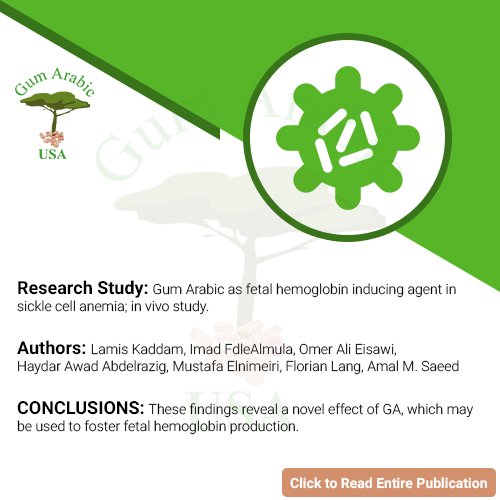HEMOGLOBIN EFFECT IN SICKLE CELL ANEMIA
There is overwhelming scientific research and medical studies done worldwide that prove Gum Arabic's Nutritional and Medicinal properties. Below we have highlighted and provided links to some of the Research publications regarding Gum Arabic aka Acacia Gum and all the conclusions. To read the entire research publication, simply click on the summary images. Do not make any medical decisions based on this information and always consult your doctor.
** This information has not been evaluated by the FDA. Products sold and Information presented are not intended to diagnose, treat, cure, or prevent any disease**
This research study focuses on the hemoglobin production induced by Acacia gum consumption on patients with sickle cell anemia
Background: Sickle Cell Anemia (SCA) is a genetic disorder that causes abnormal hemoglobin production, leading to misshapen red blood cells, which can block blood vessels and reduce oxygen delivery to organs. Fetal hemoglobin (HbF) levels are critical in SCA, as higher HbF reduces disease severity. Butyrate, which can boost HbF production, is hindered in clinical use due to its short lifespan. Gum Arabic (GA), a natural extract from the Acacia Senegal tree, can increase butyrate levels via bacterial fermentation in the colon. This study aimed to investigate whether regular GA intake could raise serum butyrate levels, promote HbF production, and alleviate SCA symptoms.
Methods: The study included 47 patients aged 5 to 42 with hemoglobin SS, recruited between April 2014 and January 2015. Patients consumed 30 grams of GA daily for 12 weeks. HbF levels, blood counts, and erythropoietin levels were measured. The primary outcome was HbF level after 12 weeks, while secondary outcomes included clinical and laboratory improvements. The study received ethical approval from Alneelain University IRB.
Results: The study revealed a significant increase in HbF levels, mean corpuscular volume (MCV), and hematocrit levels. However, platelet and white blood cell counts showed no significant differences. Around 37% of patients reported minor side effects, which resolved within a week.
Conclusion: The study suggests that GA intake can increase fetal hemoglobin production, offering a potential therapeutic approach for SCA. Further research, including longer clinical trials and gene expression analysis, is needed to better understand the sustained effects and clinical benefits of GA in managing SCA.


